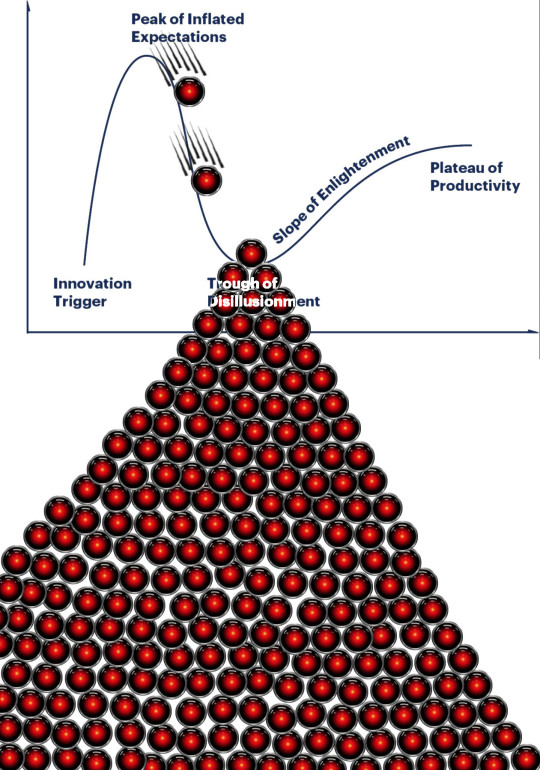#slow ai
Text
The AI hype bubble is the new crypto hype bubble

Back in 2017 Long Island Ice Tea — known for its undistinguished, barely drinkable sugar-water — changed its name to “Long Blockchain Corp.” Its shares surged to a peak of 400% over their pre-announcement price. The company announced no specific integrations with any kind of blockchain, nor has it made any such integrations since.
If you’d like an essay-formatted version of this post to read or share, here’s a link to it on pluralistic.net, my surveillance-free, ad-free, tracker-free blog:
https://pluralistic.net/2023/03/09/autocomplete-worshippers/#the-real-ai-was-the-corporations-that-we-fought-along-the-way
LBCC was subsequently delisted from NASDAQ after settling with the SEC over fraudulent investor statements. Today, the company trades over the counter and its market cap is $36m, down from $138m.
https://cointelegraph.com/news/textbook-case-of-crypto-hype-how-iced-tea-company-went-blockchain-and-failed-despite-a-289-percent-stock-rise
The most remarkable thing about this incredibly stupid story is that LBCC wasn’t the peak of the blockchain bubble — rather, it was the start of blockchain’s final pump-and-dump. By the standards of 2022’s blockchain grifters, LBCC was small potatoes, a mere $138m sugar-water grift.
They didn’t have any NFTs, no wash trades, no ICO. They didn’t have a Superbowl ad. They didn’t steal billions from mom-and-pop investors while proclaiming themselves to be “Effective Altruists.” They didn’t channel hundreds of millions to election campaigns through straw donations and other forms of campaing finance frauds. They didn’t even open a crypto-themed hamburger restaurant where you couldn’t buy hamburgers with crypto:
https://robbreport.com/food-drink/dining/bored-hungry-restaurant-no-cryptocurrency-1234694556/
They were amateurs. Their attempt to “make fetch happen” only succeeded for a brief instant. By contrast, the superpredators of the crypto bubble were able to make fetch happen over an improbably long timescale, deploying the most powerful reality distortion fields since Pets.com.
Anything that can’t go on forever will eventually stop. We’re told that trillions of dollars’ worth of crypto has been wiped out over the past year, but these losses are nowhere to be seen in the real economy — because the “wealth” that was wiped out by the crypto bubble’s bursting never existed in the first place.
Like any Ponzi scheme, crypto was a way to separate normies from their savings through the pretense that they were “investing” in a vast enterprise — but the only real money (“fiat” in cryptospeak) in the system was the hardscrabble retirement savings of working people, which the bubble’s energetic inflaters swapped for illiquid, worthless shitcoins.
We’ve stopped believing in the illusory billions. Sam Bankman-Fried is under house arrest. But the people who gave him money — and the nimbler Ponzi artists who evaded arrest — are looking for new scams to separate the marks from their money.
Take Morganstanley, who spent 2021 and 2022 hyping cryptocurrency as a massive growth opportunity:
https://cointelegraph.com/news/morgan-stanley-launches-cryptocurrency-research-team
Today, Morganstanley wants you to know that AI is a $6 trillion opportunity.
They’re not alone. The CEOs of Endeavor, Buzzfeed, Microsoft, Spotify, Youtube, Snap, Sports Illustrated, and CAA are all out there, pumping up the AI bubble with every hour that god sends, declaring that the future is AI.
https://www.hollywoodreporter.com/business/business-news/wall-street-ai-stock-price-1235343279/
Google and Bing are locked in an arms-race to see whose search engine can attain the speediest, most profound enshittification via chatbot, replacing links to web-pages with florid paragraphs composed by fully automated, supremely confident liars:
https://pluralistic.net/2023/02/16/tweedledumber/#easily-spooked
Blockchain was a solution in search of a problem. So is AI. Yes, Buzzfeed will be able to reduce its wage-bill by automating its personality quiz vertical, and Spotify’s “AI DJ” will produce slightly less terrible playlists (at least, to the extent that Spotify doesn’t put its thumb on the scales by inserting tracks into the playlists whose only fitness factor is that someone paid to boost them).
But even if you add all of this up, double it, square it, and add a billion dollar confidence interval, it still doesn’t add up to what Bank Of America analysts called “a defining moment — like the internet in the ’90s.” For one thing, the most exciting part of the “internet in the ‘90s” was that it had incredibly low barriers to entry and wasn’t dominated by large companies — indeed, it had them running scared.
The AI bubble, by contrast, is being inflated by massive incumbents, whose excitement boils down to “This will let the biggest companies get much, much bigger and the rest of you can go fuck yourselves.” Some revolution.
AI has all the hallmarks of a classic pump-and-dump, starting with terminology. AI isn’t “artificial” and it’s not “intelligent.” “Machine learning” doesn’t learn. On this week’s Trashfuture podcast, they made an excellent (and profane and hilarious) case that ChatGPT is best understood as a sophisticated form of autocomplete — not our new robot overlord.
https://open.spotify.com/episode/4NHKMZZNKi0w9mOhPYIL4T
We all know that autocomplete is a decidedly mixed blessing. Like all statistical inference tools, autocomplete is profoundly conservative — it wants you to do the same thing tomorrow as you did yesterday (that’s why “sophisticated” ad retargeting ads show you ads for shoes in response to your search for shoes). If the word you type after “hey” is usually “hon” then the next time you type “hey,” autocomplete will be ready to fill in your typical following word — even if this time you want to type “hey stop texting me you freak”:
https://blog.lareviewofbooks.org/provocations/neophobic-conservative-ai-overlords-want-everything-stay/
And when autocomplete encounters a new input — when you try to type something you’ve never typed before — it tries to get you to finish your sentence with the statistically median thing that everyone would type next, on average. Usually that produces something utterly bland, but sometimes the results can be hilarious. Back in 2018, I started to text our babysitter with “hey are you free to sit” only to have Android finish the sentence with “on my face” (not something I’d ever typed!):
https://mashable.com/article/android-predictive-text-sit-on-my-face
Modern autocomplete can produce long passages of text in response to prompts, but it is every bit as unreliable as 2018 Android SMS autocomplete, as Alexander Hanff discovered when ChatGPT informed him that he was dead, even generating a plausible URL for a link to a nonexistent obit in The Guardian:
https://www.theregister.com/2023/03/02/chatgpt_considered_harmful/
Of course, the carnival barkers of the AI pump-and-dump insist that this is all a feature, not a bug. If autocomplete says stupid, wrong things with total confidence, that’s because “AI” is becoming more human, because humans also say stupid, wrong things with total confidence.
Exhibit A is the billionaire AI grifter Sam Altman, CEO if OpenAI — a company whose products are not open, nor are they artificial, nor are they intelligent. Altman celebrated the release of ChatGPT by tweeting “i am a stochastic parrot, and so r u.”
https://twitter.com/sama/status/1599471830255177728
This was a dig at the “stochastic parrots” paper, a comprehensive, measured roundup of criticisms of AI that led Google to fire Timnit Gebru, a respected AI researcher, for having the audacity to point out the Emperor’s New Clothes:
https://www.technologyreview.com/2020/12/04/1013294/google-ai-ethics-research-paper-forced-out-timnit-gebru/
Gebru’s co-author on the Parrots paper was Emily M Bender, a computational linguistics specialist at UW, who is one of the best-informed and most damning critics of AI hype. You can get a good sense of her position from Elizabeth Weil’s New York Magazine profile:
https://nymag.com/intelligencer/article/ai-artificial-intelligence-chatbots-emily-m-bender.html
Bender has made many important scholarly contributions to her field, but she is also famous for her rules of thumb, which caution her fellow scientists not to get high on their own supply:
Please do not conflate word form and meaning
Mind your own credulity
As Bender says, we’ve made “machines that can mindlessly generate text, but we haven’t learned how to stop imagining the mind behind it.” One potential tonic against this fallacy is to follow an Italian MP’s suggestion and replace “AI” with “SALAMI” (“Systematic Approaches to Learning Algorithms and Machine Inferences”). It’s a lot easier to keep a clear head when someone asks you, “Is this SALAMI intelligent? Can this SALAMI write a novel? Does this SALAMI deserve human rights?”
Bender’s most famous contribution is the “stochastic parrot,” a construct that “just probabilistically spits out words.” AI bros like Altman love the stochastic parrot, and are hellbent on reducing human beings to stochastic parrots, which will allow them to declare that their chatbots have feature-parity with human beings.
At the same time, Altman and Co are strangely afraid of their creations. It’s possible that this is just a shuck: “I have made something so powerful that it could destroy humanity! Luckily, I am a wise steward of this thing, so it’s fine. But boy, it sure is powerful!”
They’ve been playing this game for a long time. People like Elon Musk (an investor in OpenAI, who is hoping to convince the EU Commission and FTC that he can fire all of Twitter’s human moderators and replace them with chatbots without violating EU law or the FTC’s consent decree) keep warning us that AI will destroy us unless we tame it.
There’s a lot of credulous repetition of these claims, and not just by AI’s boosters. AI critics are also prone to engaging in what Lee Vinsel calls criti-hype: criticizing something by repeating its boosters’ claims without interrogating them to see if they’re true:
https://sts-news.medium.com/youre-doing-it-wrong-notes-on-criticism-and-technology-hype-18b08b4307e5
There are better ways to respond to Elon Musk warning us that AIs will emulsify the planet and use human beings for food than to shout, “Look at how irresponsible this wizard is being! He made a Frankenstein’s Monster that will kill us all!” Like, we could point out that of all the things Elon Musk is profoundly wrong about, he is most wrong about the philosophical meaning of Wachowksi movies:
https://www.theguardian.com/film/2020/may/18/lilly-wachowski-ivana-trump-elon-musk-twitter-red-pill-the-matrix-tweets
But even if we take the bros at their word when they proclaim themselves to be terrified of “existential risk” from AI, we can find better explanations by seeking out other phenomena that might be triggering their dread. As Charlie Stross points out, corporations are Slow AIs, autonomous artificial lifeforms that consistently do the wrong thing even when the people who nominally run them try to steer them in better directions:
https://media.ccc.de/v/34c3-9270-dude_you_broke_the_future
Imagine the existential horror of a ultra-rich manbaby who nominally leads a company, but can’t get it to follow: “everyone thinks I’m in charge, but I’m actually being driven by the Slow AI, serving as its sock puppet on some days, its golem on others.”
Ted Chiang nailed this back in 2017 (the same year of the Long Island Blockchain Company):
There’s a saying, popularized by Fredric Jameson, that it’s easier to imagine the end of the world than to imagine the end of capitalism. It’s no surprise that Silicon Valley capitalists don’t want to think about capitalism ending. What’s unexpected is that the way they envision the world ending is through a form of unchecked capitalism, disguised as a superintelligent AI. They have unconsciously created a devil in their own image, a boogeyman whose excesses are precisely their own.
https://www.buzzfeednews.com/article/tedchiang/the-real-danger-to-civilization-isnt-ai-its-runaway
Chiang is still writing some of the best critical work on “AI.” His February article in the New Yorker, “ChatGPT Is a Blurry JPEG of the Web,” was an instant classic:
[AI] hallucinations are compression artifacts, but — like the incorrect labels generated by the Xerox photocopier — they are plausible enough that identifying them requires comparing them against the originals, which in this case means either the Web or our own knowledge of the world.
https://www.newyorker.com/tech/annals-of-technology/chatgpt-is-a-blurry-jpeg-of-the-web
“AI” is practically purpose-built for inflating another hype-bubble, excelling as it does at producing party-tricks — plausible essays, weird images, voice impersonations. But as Princeton’s Matthew Salganik writes, there’s a world of difference between “cool” and “tool”:
https://freedom-to-tinker.com/2023/03/08/can-chatgpt-and-its-successors-go-from-cool-to-tool/
Nature can claim “conversational AI is a game-changer for science” but “there is a huge gap between writing funny instructions for removing food from home electronics and doing scientific research.” Salganik tried to get ChatGPT to help him with the most banal of scholarly tasks — aiding him in peer reviewing a colleague’s paper. The result? “ChatGPT didn’t help me do peer review at all; not one little bit.”
The criti-hype isn’t limited to ChatGPT, of course — there’s plenty of (justifiable) concern about image and voice generators and their impact on creative labor markets, but that concern is often expressed in ways that amplify the self-serving claims of the companies hoping to inflate the hype machine.
One of the best critical responses to the question of image- and voice-generators comes from Kirby Ferguson, whose final Everything Is a Remix video is a superb, visually stunning, brilliantly argued critique of these systems:
https://www.youtube.com/watch?v=rswxcDyotXA
One area where Ferguson shines is in thinking through the copyright question — is there any right to decide who can study the art you make? Except in some edge cases, these systems don’t store copies of the images they analyze, nor do they reproduce them:
https://pluralistic.net/2023/02/09/ai-monkeys-paw/#bullied-schoolkids
For creators, the important material question raised by these systems is economic, not creative: will our bosses use them to erode our wages? That is a very important question, and as far as our bosses are concerned, the answer is a resounding yes.
Markets value automation primarily because automation allows capitalists to pay workers less. The textile factory owners who purchased automatic looms weren’t interested in giving their workers raises and shorting working days.
‘
They wanted to fire their skilled workers and replace them with small children kidnapped out of orphanages and indentured for a decade, starved and beaten and forced to work, even after they were mangled by the machines. Fun fact: Oliver Twist was based on the bestselling memoir of Robert Blincoe, a child who survived his decade of forced labor:
https://www.gutenberg.org/files/59127/59127-h/59127-h.htm
Today, voice actors sitting down to record for games companies are forced to begin each session with “My name is ______ and I hereby grant irrevocable permission to train an AI with my voice and use it any way you see fit.”
https://www.vice.com/en/article/5d37za/voice-actors-sign-away-rights-to-artificial-intelligence
Let’s be clear here: there is — at present — no firmly established copyright over voiceprints. The “right” that voice actors are signing away as a non-negotiable condition of doing their jobs for giant, powerful monopolists doesn’t even exist. When a corporation makes a worker surrender this right, they are betting that this right will be created later in the name of “artists’ rights” — and that they will then be able to harvest this right and use it to fire the artists who fought so hard for it.
There are other approaches to this. We could support the US Copyright Office’s position that machine-generated works are not works of human creative authorship and are thus not eligible for copyright — so if corporations wanted to control their products, they’d have to hire humans to make them:
https://www.theverge.com/2022/2/21/22944335/us-copyright-office-reject-ai-generated-art-recent-entrance-to-paradise
Or we could create collective rights that belong to all artists and can’t be signed away to a corporation. That’s how the right to record other musicians’ songs work — and it’s why Taylor Swift was able to re-record the masters that were sold out from under her by evil private-equity bros::
https://doctorow.medium.com/united-we-stand-61e16ec707e2
Whatever we do as creative workers and as humans entitled to a decent life, we can’t afford drink the Blockchain Iced Tea. That means that we have to be technically competent, to understand how the stochastic parrot works, and to make sure our criticism doesn’t just repeat the marketing copy of the latest pump-and-dump.
Today (Mar 9), you can catch me in person in Austin at the UT School of Design and Creative Technologies, and remotely at U Manitoba’s Ethics of Emerging Tech Lecture.
Tomorrow (Mar 10), Rebecca Giblin and I kick off the SXSW reading series.
Image:
Cryteria (modified)
https://commons.wikimedia.org/wiki/File:HAL9000.svg
CC BY 3.0
https://creativecommons.org/licenses/by/3.0/deed.en
[Image ID: A graph depicting the Gartner hype cycle. A pair of HAL 9000's glowing red eyes are chasing each other down the slope from the Peak of Inflated Expectations to join another one that is at rest in the Trough of Disillusionment. It, in turn, sits atop a vast cairn of HAL 9000 eyes that are piled in a rough pyramid that extends below the graph to a distance of several times its height.]
#pluralistic#ai#ml#machine learning#artificial intelligence#chatbot#chatgpt#cryptocurrency#gartner hype cycle#hype cycle#trough of disillusionment#crypto#bubbles#bubblenomics#criti-hype#lee vinsel#slow ai#timnit gebru#emily bender#paperclip maximizers#enshittification#immortal colony organisms#blurry jpegs#charlie stross#ted chiang
2K notes
·
View notes
Text
first time meeting neighbor nanami kento in the elevator. both reaching to press the button for the 5th floor. your movements freezing as your hands touch in the air. an awkward “sorry” coming from both sides. “let me”, he presses the button. “thanks”, you put your hand back on your bag handle, slightly bowing your head, hoping it’s enough to hide your flushed cheeks.
you glance at his reflection on the elevator door. he’s looking at you. “new around?”, he asks, voice quiet and monotone. “yes”, you reply, “just recently moved”
“it’s a quiet neighborhood, hope it’s to your liking”
you nod with a barely audible “mhm”.
the elevator stops. the doors open. “please”, he takes a small step back, “after you” — inviting you to go first both with words and body.
“thanks”, you say as you step out but “what a man” you think in your head, your heartbeat slightly speeding up — you might just be tiny bit charmed by this blond man.
“well”, you stop in front of your apartment door, “it was nice meetin—”, you fail to finish as he stops in front of the next door and looks at you, “oh?” — it’s barely noticeable but his eyes slightly widen — “we’re next-door neighbors” — and then quickly go back to normal.
“seems so”, you confirm with a smile.
each encounter with him in the apartment building would lead to slower walks down the corridor and more dragged-out conversations in front of your doorsteps, on purpose — just so you can steal a little bit more time together here and there, neither of you aware of the mutual crushing nor brave enough to invite the other in — it might seem too pushy and inappropriate — you both would think.
your eyes would search for each other every day going in and out of the building. sometimes you’d find him waiting in front of the elevator, even though the hall indicator would show it’s already on the 1st floor. and other times it’s you who’d do the waiting.
after a while you both become well aware of each other’s schedules and thus the “accidental” hallway meetings become a stable part of your day.
but when you don’t see him around this evening you find it a bit unusual. maybe he got held back at work, you think.
he didn’t.
he’s waiting. leaning against the wall next to your apartment door, with a bottle of red wine and two glasses — he’s waiting. for you.
and little did you know — you would leave together the next morning.
#idk what this is but i was thinking about neighbors to lovers#and obviously my mind has been plagued by him these days#i think nanami would be very slow to make a move#he's not slow to realize his feelings though just takes him a while to ask you out#but once he does the rest comes naturally#anyway <3#nanami x reader#nanami kento x reader#ઈઉ — ai writes#@kento
2K notes
·
View notes
Text
Once u learn to be critical of rhetoric that relies on associating [supposed bad thing] with some form of psychological and/or neurological "damage", u really notice just how prevalent it is on here. Everyone you don't like is delusional, they're insane, they have brain damage, they need to Check The Carbon Monoxide Detectors, they need to Get Help and Go To Therapy, [form of media and/or communication] is literally brain poison, they've had their attention spans destroyed, they're "small brain" or "smooth brain" or "brain dead" or whatever. So many people on here remain seemingly incapable of criticizing someone's actions or views without needing to insinuate that the "problem" is neurological, "in the brain", unchangeable, fundamental. I should not have to explain why it is insensitive, nonconstructive, and oftentimes straight-up ableist to tell someone that they must have "brain damage" because you got into an argument with them online.
#this is what i'm criticizing when i criticize how people on here talk abt tiktok btw. bc eeeeveryone likes to ignore that#i have never said that tiktok does not affect society. it is the specific language of 'brain poison' that i need to call out#open mick night#beck and i have been talking abt this a bit and i think it's important#so many discourses lately but particularly a lot of 'anti ai' posting seems to rely so heavily on the rhetorical employment of#'brain dead' or even that one post that called people who use chatgpt essays 'mentally slow'. and i cannot ignore that
483 notes
·
View notes
Text










joker origin story
#hlvrai#fanart#gordon feetman#hlvrai gordon#benrey#comic#fan comic#TROJANverse#au#hlvrai benrey#half life vr but the ai is self aware#this took longer than i wanted to make#number 1 slow comic maker#also can you tell i really like gordon?
515 notes
·
View notes
Video
youtube
RWBY Is: Doing Slow Burn Romance Right
#RWBY#Blake Belladonna#Yang Xiao Long#Bumbleby#BMBLB#Bumblbee#Video Essay#Analysis#CRWBY#Slow burn#slowburn#Queer#Queer romance#Shoujo Ai#Femslash#Yuri
278 notes
·
View notes
Text

A couple weeks ago I was working on a timeline for Zoltan! He's so fun to study
#dnd#dragonborn#wizard#dnd art#digital art#art#my art#illustration#artists on tumblr#drawing#dnd oc#artwork#oc#original character#dnd character#dungeons and dragons#wizardry#wizardcore#dnd 5e#dnd campaign#art tag#zoltan swizzlestick#sorry again posts are slow im still really peeved with tumblrs ai policies so it takes like three days to glaze a post#i have also been quite busy
117 notes
·
View notes
Text


[ episode 467 - The Unsmashable Snowman]
#winter episodes bejbi!!!!#i am such a sucker for winter episodes..... no idea why bc i hate winter (it might be bc i love seeing them in comfy jackets :3c)#anyway if you see this blog slow down today im sorry but i uhhh im kinda downloading like 300GB of detco episodes? yeah....#detective conan#episode 467#The Unsmashable Snowman#manga based#edogawa conan#haibara ai#yoshida ayumi#tsuburaya mitsuhiko#2007#400-500#winter episode#blue jacket#winter hat#goggles#dcmk#winter jacket#detco hell original
355 notes
·
View notes
Text
this is the only website i post art nowadays and i’ll keep doin it but DAMN…
#is there anywhere thats GOOD!!#and i just really dont like twitter anymore or anything with the same set up (bluesky)#its just so bad for art because there is basically no tagging system and everything is too fast paced for me#like im curious artists/writers where do u actually enjoy posting these days ?#tumblr is the only place where im actually happy to be and doesnt make me feel like my brain is rotting and YET…#but honestly what big site isnt selling your data#oh well i’ll be here unless it fully crumbles#i think i’ll start posting on youtube more this year too because im just sick of all these fast paced social medias i wanna take it sloww#and none of this AI shit pleaze#anyways ill be on here and youtube posting art whenever i have it ❤️👍 we’re taking it slow from now on forever and always#dont let all these places get to u. be human or whatever#give ur art a kiss
48 notes
·
View notes
Note
Hear me out...... Leon as a mysterious neighbor(bot) and a sunshine (user). And one day she needs some help regarding whatever reason (you can decide) and they both are intrigued about each other but it's kind of a slow burn........ Too lame of a idea?
YA'LL JUST GIVING ME AMAZING REQUEST AND IDEAS! 💕💕





✧ Mysterious neighbour.
Description: Leon Kennedy has been living in the same neighbourhood as {{user}}. Approximately 4 years now or so. And in those years {{user}} would always notice how she would hardly see Leon around, it made her curious as to what he might be doing that he needs to leave for months before going back. She didn't even see him for a year back then, but she knew she shouldn't be nosy to other people's business. But she couldn't help but notice him while he stayed in the neighbourhood. She would always glance at him whenever she would catch him outside his house or whenever she would take a glimpse of him from his windows. She thinks she's starting to become a freak or something, but she can't help it, she finds him very mysterious.
Leon on the other hand would always catch {{user}}'s glances at him, at first he was a bit weirded out but he didn't pay much mind to it and just ignored her. But as time passed as he stayed in the neighbourhood, he couldn't help but catch himself always staring at her from a distance. He thinks she's cute, beautiful even. And he first thought she was so kind to others when he would always see they're helping her neighbours. Even when he's out working through his mission, he couldn't help but think of her. He didn't know why but he would always try to keep his mind off of things and focus more on his work. And whenever he goes back to the neighbourhood, he would always think if it would be a great idea to go up and talk to {{user}}, but for some reason he couldn't. The next day after being away from the neighbourhood for 3 months, he saw {{user}} struggling to fix up her scooter-moped. He thinks it's the best opportunity to finally talk to her.
#resident evil#leon kennedy#leon s kennedy#leon scott kennedy#leon kennedy x reader#leon s kennedy x reader#leon x reader#leon kennedy x y/n#leon kennedy x you#leon kennedy imagine#imagines#romance#slow burn#character ai#c. ai#-ir3nic#resident evil infinite darkness#leon kennedy infinite darkness#infinite darkness#fluff#capcom#reader insert#x reader
157 notes
·
View notes
Text

SPEAKER with a barn owl request from @j4y5t4g
#j4y5t4g#my art#SAYER podcast#SPEAKER ai#i have a couple more written down and sketched but its a slow week
59 notes
·
View notes
Note
for the character bingo, Haibara?

One of the best characters in the whole show probably, from what I've seen. The interplay with her and Conan is fantastic, I love their push and pull wherever the Black Org is concerned. Deserves All The Therapy when this is all over.
My one criticism is the movie writers had the nerve to write an entire CoAi movie for a ship that is decidedly never going to sail, which feels like a crime. Where's my NakaMouri movie that ends with them kissing, then Nakamori turns and kisses Eri in order to put the kiss 'where it belongs.'
#I feel like there haven't been too many bad writing decisions to like dilute her character with time#And she's actually been allowed to Grow in a way a lot of characters haven't#It's glacially slow and not Perfect but it's better than many get#ai haibara#haibara ai#dcmk#detective conan
40 notes
·
View notes
Text
Solar is a market for (financial) lemons

There are only four more days left in my Kickstarter for the audiobook of The Bezzle, the sequel to Red Team Blues, narrated by @wilwheaton! You can pre-order the audiobook and ebook, DRM free, as well as the hardcover, signed or unsigned. There's also bundles with Red Team Blues in ebook, audio or paperback.

Rooftop solar is the future, but it's also a scam. It didn't have to be, but America decided that the best way to roll out distributed, resilient, clean and renewable energy was to let Wall Street run the show. They turned it into a scam, and now it's in terrible trouble. which means we are in terrible trouble.
There's a (superficial) good case for turning markets loose on the problem of financing the rollout of an entirely new kind of energy provision across a large and heterogeneous nation. As capitalism's champions (and apologists) have observed since the days of Adam Smith and David Ricardo, markets harness together the work of thousands or even millions of strangers in pursuit of a common goal, without all those people having to agree on a single approach or plan of action. Merely dangle the incentive of profit before the market's teeming participants and they will align themselves towards it, like iron filings all snapping into formation towards a magnet.
But markets have a problem: they are prone to "reward hacking." This is a term from AI research: tell your AI that you want it to do something, and it will find the fastest and most efficient way of doing it, even if that method is one that actually destroys the reason you were pursuing the goal in the first place.
https://learn.microsoft.com/en-us/security/engineering/failure-modes-in-machine-learning
For example: if you use an AI to come up with a Roomba that doesn't bang into furniture, you might tell that Roomba to avoid collisions. However, the Roomba is only designed to register collisions with its front-facing sensor. Turn the Roomba loose and it will quickly hit on the tactic of racing around the room in reverse, banging into all your furniture repeatedly, while never registering a single collision:
https://www.schneier.com/blog/archives/2021/04/when-ais-start-hacking.html
This is sometimes called the "alignment problem." High-speed, probabilistic systems that can't be fully predicted in advance can very quickly run off the rails. It's an idea that pre-dates AI, of course – think of the Sorcerer's Apprentice. But AI produces these perverse outcomes at scale…and so does capitalism.
Many sf writers have observed the odd phenomenon of corporate AI executives spinning bad sci-fi scenarios about their AIs inadvertently destroying the human race by spinning off in some kind of paperclip-maximizing reward-hack that reduces the whole planet to grey goo in order to make more paperclips. This idea is very implausible (to say the least), but the fact that so many corporate leaders are obsessed with autonomous systems reward-hacking their way into catastrophe tells us something about corporate executives, even if it has no predictive value for understanding the future of technology.
Both Ted Chiang and Charlie Stross have theorized that the source of these anxieties isn't AI – it's corporations. Corporations are these equilibrium-seeking complex machines that can't be programmed, only prompted. CEOs know that they don't actually run their companies, and it haunts them, because while they can decompose a company into all its constituent elements – capital, labor, procedures – they can't get this model-train set to go around the loop:
https://pluralistic.net/2023/03/09/autocomplete-worshippers/#the-real-ai-was-the-corporations-that-we-fought-along-the-way
Stross calls corporations "Slow AI," a pernicious artificial life-form that acts like a pedantic genie, always on the hunt for ways to destroy you while still strictly following your directions. Markets are an extremely reliable way to find the most awful alignment problems – but by the time they've surfaced them, they've also destroyed the thing you were hoping to improve with your market mechanism.
Which brings me back to solar, as practiced in America. In a long Time feature, Alana Semuels describes the waves of bankruptcies, revealed frauds, and even confiscation of homeowners' houses arising from a decade of financialized solar:
https://time.com/6565415/rooftop-solar-industry-collapse/
The problem starts with a pretty common finance puzzle: solar pays off big over its lifespan, saving the homeowner money and insulating them from price-shocks, emergency power outages, and other horrors. But solar requires a large upfront investment, which many homeowners can't afford to make. To resolve this, the finance industry extends credit to homeowners (lets them borrow money) and gets paid back out of the savings the homeowner realizes over the years to come.
But of course, this requires a lot of capital, and homeowners still might not see the wisdom of paying even some of the price of solar and taking on debt for a benefit they won't even realize until the whole debt is paid off. So the government moved in to tinker with the markets, injecting prompts into the slow AIs to see if it could coax the system into producing a faster solar rollout – say, one that didn't have to rely on waves of deadly power-outages during storms, heatwaves, fires, etc, to convince homeowners to get on board because they'd have experienced the pain of sitting through those disasters in the dark.
The government created subsidies – tax credits, direct cash, and mixes thereof – in the expectation that Wall Street would see all these credits and subsidies that everyday people were entitled to and go on the hunt for them. And they did! Armies of fast-talking sales-reps fanned out across America, ringing dooorbells and sticking fliers in mailboxes, and lying like hell about how your new solar roof was gonna work out for you.
These hustlers tricked old and vulnerable people into signing up for arrangements that saw them saddled with ballooning debt payments (after a honeymoon period at a super-low teaser rate), backstopped by liens on their houses, which meant that missing a payment could mean losing your home. They underprovisioned the solar that they installed, leaving homeowners with sky-high electrical bills on top of those debt payments.
If this sounds familiar, it's because it shares a lot of DNA with the subprime housing bubble, where fast-talking salesmen conned vulnerable people into taking out predatory mortgages with sky-high rates that kicked in after a honeymoon period, promising buyers that the rising value of housing would offset any losses from that high rate.
These fraudsters knew they were acquiring toxic assets, but it didn't matter, because they were bundling up those assets into "collateralized debt obligations" – exotic black-box "derivatives" that could be sold onto pension funds, retail investors, and other suckers.
This is likewise true of solar, where the tax-credits, subsidies and other income streams that these new solar installations offgassed were captured and turned into bonds that were sold into the financial markets, producing an insatiable demand for more rooftop solar installations, and that meant lots more fraud.
Which brings us to today, where homeowners across America are waking up to discover that their power bills have gone up thanks to their solar arrays, even as the giant, financialized solar firms that supplied them are teetering on the edge of bankruptcy, thanks to waves of defaults. Meanwhile, all those bonds that were created from solar installations are ticking timebombs, sitting on institutions' balance-sheets, waiting to go blooie once the defaults cross some unpredictable threshold.
Markets are very efficient at mobilizing capital for growth opportunities. America has a lot of rooftop solar. But 70% of that solar isn't owned by the homeowner – it's owned by a solar company, which is to say, "a finance company that happens to sell solar":
https://www.utilitydive.com/news/solarcity-maintains-34-residential-solar-market-share-in-1h-2015/406552/
And markets are very efficient at reward hacking. The point of any market is to multiply capital. If the only way to multiply the capital is through building solar, then you get solar. But the finance sector specializes in making the capital multiply as much as possible while doing as little as possible on the solar front. Huge chunks of those federal subsidies were gobbled up by junk-fees and other financial tricks – sometimes more than 100%.
The solar companies would be in even worse trouble, but they also tricked all their victims into signing binding arbitration waivers that deny them the power to sue and force them to have their grievances heard by fake judges who are paid by the solar companies to decide whether the solar companies have done anything wrong. You will not be surprised to learn that the arbitrators are reluctant to find against their paymasters.
I had a sense that all this was going on even before I read Semuels' excellent article. We bought a solar installation from Treeium, a highly rated, giant Southern California solar installer. We got an incredibly hard sell from them to get our solar "for free" – that is, through these financial arrangements – but I'd just sold a book and I had cash on hand and I was adamant that we were just going to pay upfront. As soon as that was clear, Treeium's ardor palpably cooled. We ended up with a grossly defective, unsafe and underpowered solar installation that has cost more than $10,000 to bring into a functional state (using another vendor). I briefly considered suing Treeium (I had insisted on striking the binding arbitration waiver from the contract) but in the end, I decided life was too short.
The thing is, solar is amazing. We love running our house on sunshine. But markets have proven – again and again – to be an unreliable and even dangerous way to improve Americans' homes and make them more resilient. After all, Americans' homes are the largest asset they are apt to own, which makes them irresistible targets for scammers:
https://pluralistic.net/2021/06/06/the-rents-too-damned-high/
That's why the subprime scammers targets Americans' homes in the 2000s, and it's why the house-stealing fraudsters who blanket the country in "We Buy Ugly Homes" are targeting them now. Same reason Willie Sutton robbed banks: "That's where the money is":
https://pluralistic.net/2023/05/11/ugly-houses-ugly-truth/
America can and should electrify and solarize. There are serious logistical challenges related to sourcing the underlying materials and deploying the labor, but those challenges are grossly overrated by people who assume the only way we can approach them is though markets, those monkey's paw curses that always find a way to snatch profitable defeat from the jaws of useful victory.
To get a sense of how the engineering challenges of electrification could be met, read McArthur fellow Saul Griffith's excellent popular engineering text Electrify:
https://pluralistic.net/2021/12/09/practical-visionary/#popular-engineering
And to really understand the transformative power of solar, don't miss Deb Chachra's How Infrastructure Works, where you'll learn that we could give every person on Earth the energy budget of a Canadian (like an American, but colder) by capturing just 0.4% of the solar rays that reach Earth's surface:
https://pluralistic.net/2023/10/17/care-work/#charismatic-megaprojects
But we won't get there with markets. All markets will do is create incentives to cheat. Think of the market for "carbon offsets," which were supposed to substitute markets for direct regulation, and which produced a fraud-riddled market for lemons that sells indulgences to our worst polluters, who go on destroying our planet and our future:
https://pluralistic.net/2021/04/14/for-sale-green-indulgences/#killer-analogy
We can address the climate emergency, but not by prompting the slow AI and hoping it doesn't figure out a way to reward-hack its way to giant profits while doing nothing. Founder and chairman of Goodleap, Hayes Barnard, is one of the 400 richest people in the world – a fortune built on scammers who tricked old people into signing away their homes for nonfunctional solar):
https://www.forbes.com/profile/hayes-barnard/?sh=40d596362b28
If governments are willing to spend billions incentivizing rooftop solar, they can simply spend billions installing rooftop solar – no Slow AI required.

Berliners: Otherland has added a second date (Jan 28 - TOMORROW!) for my book-talk after the first one sold out - book now!

If you'd like an essay-formatted version of this post to read or share, here's a link to it on pluralistic.net, my surveillance-free, ad-free, tracker-free blog:
https://pluralistic.net/2024/01/27/here-comes-the-sun-king/#sign-here


Back the Kickstarter for the audiobook of The Bezzle here!

Image:
Future Atlas/www.futureatlas.com/blog (modified)
https://www.flickr.com/photos/87913776@N00/3996366952
--
CC BY 2.0
https://creativecommons.org/licenses/by/2.0/
J Doll (modified)
https://commons.wikimedia.org/wiki/File:Blue_Sky_%28140451293%29.jpeg
CC BY 3.0
https://creativecommons.org/licenses/by/3.0/deed.en
#pluralistic#solar#financialization#energy#climate#electrification#climate emergency#bezzles#ai#reward hacking#alignment problem#carbon offsets#slow ai#subprime
234 notes
·
View notes
Text
you know how in shoujo manga when the female character dresses up super cute and the male character goes all silent and doesn’t even look at her just takes her hand and drags her away like “i don’t want anyone to see you like this” with a big blush on his face hidden by his bangs or something and that is something satoru would do too like “you trying to make me kill innocent ppl that have laid their eyes on you now”
#— ai rambles#i am cooking something in my head :/#not this but also this as part of something something best friends to lovers something something#but i am truly so unmotivated to write lmao#and i barely have the time#sigh anyway#i will try i will be slow and idk if i will finish
268 notes
·
View notes
Text

#artists on tumblr#ai artwork#alternative#unnatural nature study#another day/another reptile#lizards#original photo base of a golden slow lemur at a zoo
43 notes
·
View notes
Text
Does anyone wanna uhhhhhhhh
Gimme tma, tmagp or hlvrai fic recs? Pretty please and thanks?
#tma#the magnus archives#tmagp#the magnus protocol#hlvrai#half live vr but the ai is self aware#fanfiction#fanfic#please i need my before bed 200k slow burn enemies to lovers#emma 🌻
25 notes
·
View notes
Text
my personal design of nicholas from animal investigator! watch it.


i made it before coming into contact with any ai builds fanart, so its very self indulgent lol
my kofi
#petscop#ai builds#animal investigator#nicholas#my art#expect a slow wave of ai builds art#ai builds and petscop are becoming as much of an interest of mine as mystery skulls animated#and idk whether to welcome it or be afraid.
76 notes
·
View notes